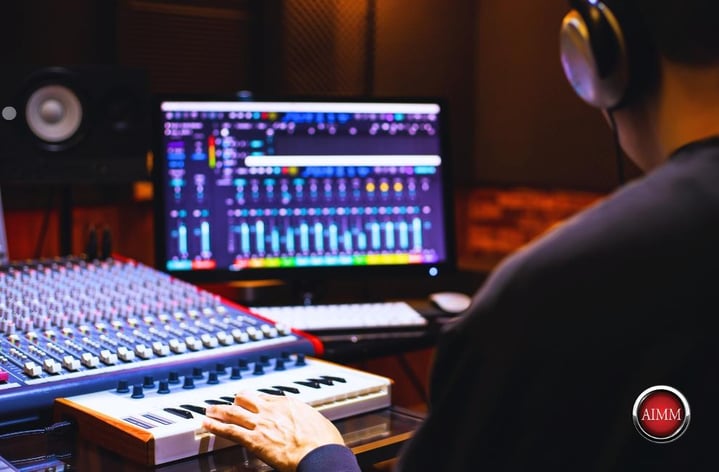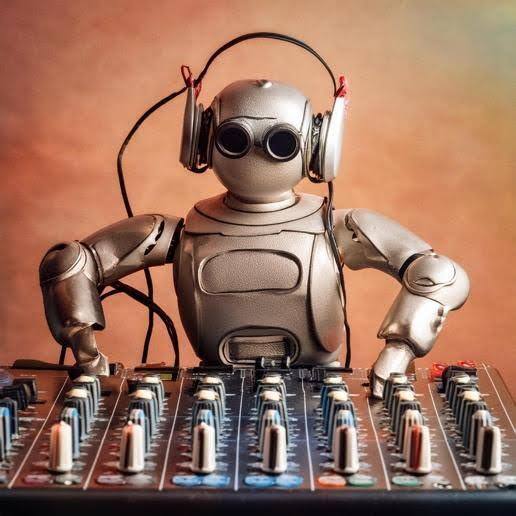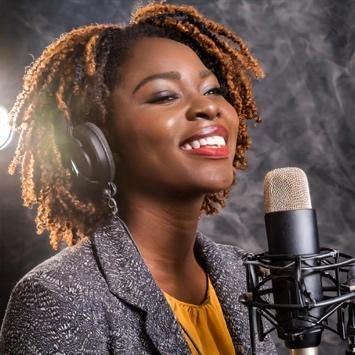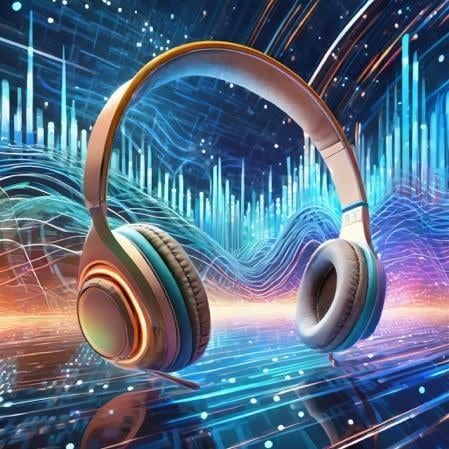- AI as a Collaborative Tool, Not a Replacement: While AI has the capability to create music, it's not a threat to musicians. Instead, it's a tool that should be used to enhance the music creation process, offering a new kind of collaboration for musicians, songwriters, and creators. AI can generate ideas quickly, handle tedious tasks, and help explore new musical territories.
- The Future of AI in Music and Education: AI is set to play a significant role in the future of music and music education. From generative AI creating unique compositions to its integration in music education, AI is becoming an integral part of the music industry and curriculum.
- Embracing AI at AIMM: The Atlanta Institute of Music and Media (AIMM) is embracing AI in its curriculum, equipping students with the skills they need to navigate the evolving music landscape. Whether in-person or through 100% online music programs, AIMM is preparing students for the future of music, including AI.
Artificial intelligence, or AI, has become a hot topic in the world of music. Will AI in music threaten musicians, or will it become a game-changing tool?
We see AI as an exciting opportunity at the Atlanta Institute of Music and Media (AIMM). We believe it's a tool that can help musicians create, innovate, and push the boundaries of what's possible in music. We recently published a blog post about How AI Could Empower Independent Artists.
Below, we'll dive into the world of AI in music and explore how it's shaping the future of music education. So, if you're passionate about music and curious about the future, keep reading!
Table Of Contents
- What is AI Music?
- The Evolution of AI in Music
- Why New AI Will Never Replace Musicians Completely
- AI and How It Will Affect Musicians, Songwriters, and Creators
- What Makes AI Music Exciting for Music Producers?
- The Future of AI in Music
- AI in Music Education
- How Music Schools Like AIMM Can Embrace AI
What is AI Music?
AI music is a fascinating blend of technology and creativity. It refers to tracks or compositions that are created using artificial intelligence.
AI programs use machine learning and complex algorithms to produce different parts of a track or even an entire piece of music. They can do this in two ways.
First, they can rearrange existing music samples to create something new. This is similar to how a DJ might remix a song.
Second, AI can learn how to compose a unique piece of music from scratch. It does this by analyzing large databases of music and learning patterns and structures. Then, it uses this knowledge to create its original compositions.
In both cases, AI does more than just play music—it's creating it. And that's what makes AI music such an exciting field.
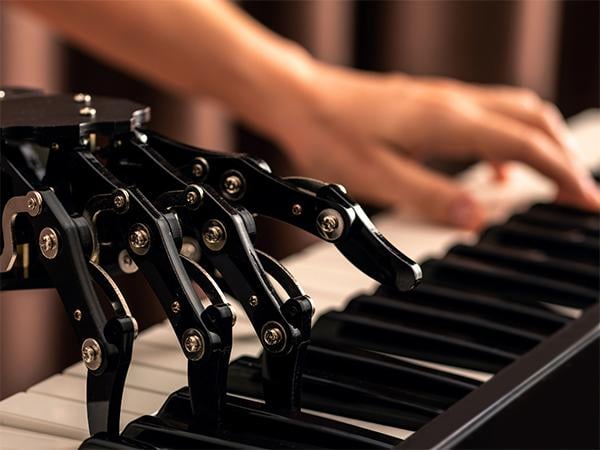
The Evolution of AI in Music
AI's involvement in music dates back to 1951 and scientist Alan Turing. The first major achievement was Turing's creation of the "Illiac Suite" in 1958, inspired by Bach's music and the first composition created by an electronic computer.
Today AI still isn't advanced enough to create entire musical compositions on its own. One of its primary functions now is to generate pre-made music to be used as stock soundtracks for video content.
However, AI is constantly evolving and improving, so it's possible that this may change in the future. The future of AI in music is exciting and full of possibilities.
For instance, combining holograms and voice synthesis could potentially lead to new album tours for deceased musicians. This raises intriguing questions about the future of music celebrities, especially in highly commercialized genres like pop.
There are concerns among critics that AI music generators could potentially violate music copyright laws. This is because they use prior works from original artists in their training to create a cohesive audio mosaic, which may be copyright infringement as outlined in the US Copyright Act.
However, it's important to remember that AI should be treated as like one of the many music tools already available to speed up and maximize the composition process, not as a replacement for "real artists". It's a partner in the creative process, helping us push the boundaries of what's possible in music.
Why New AI Will Never Replace Musicians Completely
AI has made significant strides in music, but it shouldn't be seen as a threat to musicians. While AI can mimic patterns and produce unique compositions, it relies on existing datasets that originated from human creativity.
It's a tool that can expedite and enhance the composition process but can't replace the human touch or emotion in music.
Throughout history, technological progress has frequently resulted in initial job losses, yet it has ultimately created more opportunities. A prime example is the shift from horses to cars and the introduction of ATMs, which initially caused job losses but ultimately opened up more business prospects and employment opportunities.
Similarly, AI and automation affect tasks, not entire job positions. They excel at performing specific tasks, freeing up musicians to focus on more complex and higher-level creative responsibilities.
AI tools are also democratizing the music industry, opening doors for more people to enter the music scene and perform various roles such as composing, performing, writing lyrics, promoting, and marketing. We believe musicians will eventually have to embrace AI technology to stay relevant in the evolving music landscape.
This could mean using AI-powered tools to enhance music production, leveraging AI-powered platforms for music distribution, promotion, and discovery, or incorporating AI technology into live performances.
AI can be seen as a friend rather than a foe to musicians. It offers them advanced tools to produce, perform, and share music in previously unimagined ways.
AI and How It Will Affect Musicians, Songwriters, and Creators
The music industry was already experiencing a shift as remote collaboration became the standard during the pandemic. With the help of AI, a new form of collaboration has emerged in music creation, allowing musicians to connect with a distinct collaborator in AI.
The use of AI in music production is also leading to the development of instruments that can be played by people with disabilities. This advancement in AI and music is a major step towards making music more inclusive and accessible.
The use of AI in music production, in general, has become increasingly prevalent. Musicians are discovering how to incorporate AI-powered tools into their creative process, improving efficiency and enhanced creativity.
From composing to mixing, AI is being utilized in various aspects of music creation, offering a fresh perspective on its role in the industry.
However, while AI is a powerful tool, it's not at a stage where it can replace human musicians. The emotion, creativity, and originality that human musicians bring to their work are aspects that AI-generated music has yet to replicate successfully.
So, while we explore the future of AI in music, it's essential to remember that AI is a tool to enhance music creation, not a replacement for the human element in music.
What Makes AI Music Exciting for Music Producers?
The emergence of AI should be exciting for music producers. If used correctly, AI can be a creative partner that can inspire new ideas and streamline the production process.
One of the most significant advantages of AI in music production is its ability to generate ideas quickly. Need a new melody or a unique beat? AI can generate hundreds of options in seconds, providing a wealth of material to spark creativity. This is particularly useful during the early stages of a project when ideas are being formed.
AI can also handle some of the more tedious aspects of music production, like mixing and mastering. These tasks can be time-consuming and require a high level of technical skill. However, AI tools can automate these processes, freeing producers to focus on the creative aspects of their work.
Finally, AI is making music production more accessible. High-quality AI tools are becoming more affordable and easier to use, opening up music production to a broader audience. This democratization of music production is one of the most exciting developments in the industry.
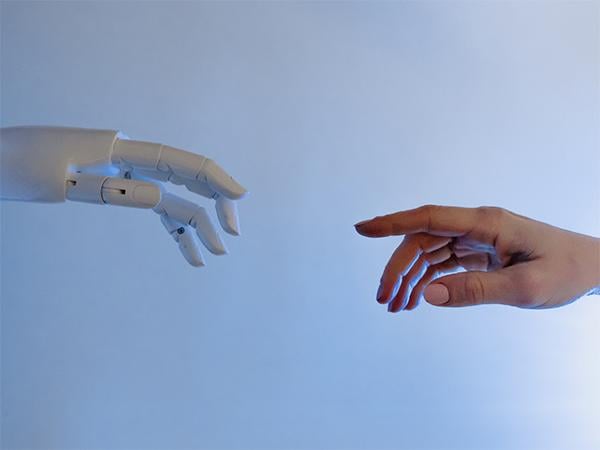
The Future of AI in Music
The future of music is expected to be greatly influenced by AI. The potential applications are limitless, ranging from AI-generated music that is one-of-a-kind to AI-driven music videos that offer compelling visuals.
As AI technology continues to evolve, we can expect it to become an even more integral part of the music industry, offering new ways to create, perform, and experience music. However, it's essential to treat AI as a tool. It should never be a replacement for human creativity and emotion in music.
AI in Music Education
Incorporating AI in music education is a forward-thinking approach that AIMM is embracing. Understanding AI and its applications in music is becoming increasingly important for aspiring musicians and producers.
By figuring out the best ways to incorporate AI into our curriculum, we will be able to equip our students with the skills they need to navigate the evolving music landscape.
From using AI in music projects to understanding its role in music composition and production, we're preparing our students for the future of music.
How Music Schools Like AIMM Can Embrace AI
Embracing AI in music is more than just a trend; it's necessary for any modern music school. We want to lead the way at the Atlanta Institute of Music and Media (AIMM). We provide an immersive, non-stop music atmosphere where skills are guaranteed to blossom, and AI will be part of the learning experience.
Whether you're in Atlanta or elsewhere, AIMM has you covered with 100% online music programs. We're committed to equipping our students with the best industry tips and techniques.
If you have the drive to succeed in the music industry but don't know where to start, AIMM can put you on the right path. We believe that AI is not a threat but a tool that can open up new opportunities and possibilities in music.
So, are you ready to pursue your passion and explore the exciting world of AI in music? Click below to learn how AIMM can benefit your music career.
References:
- https://www.nytimes.com/2023/05/11/learning/what-students-are-saying-about-ai-generated-music.html
- https://www.vice.com/en/article/88qzpa/artificial-intelligence-music-industry-future
- https://www.droptrack.com/ai-is-not-a-threat-to-musicians/
- https://thehill.com/homenews/house/4070544-music-industry-sounds-alarm-over-ai-threat-calls-on-congress-to-act/
- https://uppbeat.io/blog/ai-music-vs-real-music/
- https://sustainablereview.com/ai-music/
